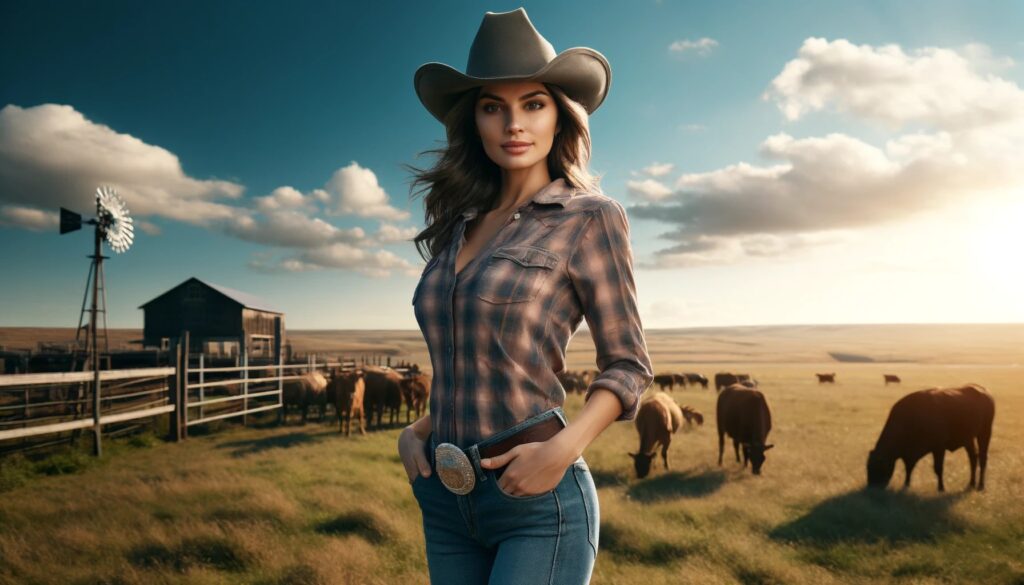
Pussycat Ranch A photorealistic wide aspect image of a female rancher in Texas standing in a vast field. She is wearing a cowboy hat a plaid shirt jeans and boots2.webp.jpeg
The Importance of Female Cattle Ranchers in Oklahoma
The state of Oklahoma, with its rich agricultural heritage and vast open spaces, is a significant player in the United States cattle industry. Among the state’s numerous cattle ranchers, a growing number of women are making their mark, bringing innovation, sustainability, and a fresh perspective to this traditionally male-dominated field. Female cattle ranchers in Oklahoma are not only contributing to the economic vitality of the state but also setting new standards in ranch management and community leadership. This article explores the critical role that female cattle ranchers play in Oklahoma, highlighting their contributions, challenges, and the broader implications of their work.
Historical Context and Evolution
Historically, cattle ranching has been seen as a man’s job, with women often relegated to supportive roles. However, the landscape has been changing, with more women taking on leadership positions within the industry. In Oklahoma, this shift has been particularly noticeable. The state’s agricultural roots date back to the late 19th century when ranching became a crucial part of the economy. Women, although often overlooked in historical accounts, have always played a vital role in the operation and success of family ranches. Today, they are stepping into the spotlight, recognized for their contributions and leadership.
Economic Contributions
Female cattle ranchers significantly contribute to Oklahoma’s economy. The state is one of the leading producers of beef in the United States, and women are at the forefront of this industry. They manage large herds, oversee complex operations, and engage in direct sales and marketing. Their economic impact is substantial, supporting local communities and the broader state economy. Women ranchers are also known for their innovative approaches to business, often diversifying their operations to include agritourism, direct-to-consumer sales, and value-added products such as artisanal cheeses and organic beef.
Sustainable Practices
Sustainability is a key focus for many female cattle ranchers. They understand the importance of preserving the land for future generations and often implement eco-friendly practices in their operations. This includes rotational grazing, water conservation, and organic farming methods. By maintaining healthy pastures and reducing their environmental footprint, these women are ensuring that their ranches remain productive and sustainable. Their efforts not only benefit their own operations but also contribute to the overall health of Oklahoma’s agricultural ecosystem.
Community Leadership
Female cattle ranchers in Oklahoma often take on leadership roles within their communities. They are active in local agricultural organizations, participate in educational outreach, and advocate for policies that support sustainable farming and ranching practices. Their leadership extends beyond the ranch, influencing the broader agricultural community and setting a positive example for future generations. Women ranchers are also known for their collaborative spirit, often working together to share resources, knowledge, and support.
Educational Impact
Education is another area where female cattle ranchers are making a significant impact. Many of these women hold advanced degrees in agriculture, animal science, and related fields. They bring a wealth of knowledge and expertise to their operations, continuously seeking to improve and innovate. Additionally, they are committed to educating the next generation of ranchers. Through programs like 4-H and FFA (Future Farmers of America), they mentor young people, teaching them about sustainable practices, animal husbandry, and the business of ranching. This educational outreach is critical in ensuring the future of cattle ranching in Oklahoma.
Overcoming Challenges
Despite their many contributions, female cattle ranchers face unique challenges. The physical demands of ranching, combined with societal expectations and gender biases, can create significant obstacles. However, these women are known for their resilience and determination. They navigate these challenges with grace and ingenuity, finding creative solutions and leveraging their networks for support. Organizations like the American National CattleWomen (ANCW) and the Oklahoma CattleWomen (OCW) provide valuable resources, advocacy, and community for female ranchers, helping them overcome barriers and succeed in their endeavors.
The Role of Technology
Technology plays a crucial role in modern cattle ranching, and female ranchers in Oklahoma are at the forefront of adopting and integrating new technologies. From GPS-guided equipment for efficient land management to data analytics for herd health monitoring, these women are leveraging technology to enhance their operations. Technology not only improves efficiency and productivity but also allows for better decision-making and more sustainable practices. Female ranchers are particularly adept at using technology to balance the demands of ranching with their other responsibilities, showcasing their adaptability and forward-thinking approach.
Advocacy and Policy Influence
Female cattle ranchers in Oklahoma are influential advocates for agricultural policy and reform. They understand the importance of having a voice in the legislative process and actively engage with policymakers to advocate for the needs and interests of ranchers. Their advocacy efforts focus on a range of issues, including land use regulations, environmental conservation, and access to resources and funding for female farmers. By participating in policy discussions and advocating for change, they help shape the future of agriculture in Oklahoma and beyond.
Personal Stories: Voices from the Field
To truly understand the impact of female cattle ranchers in Oklahoma, it’s essential to hear their stories. These personal narratives provide insight into their experiences, challenges, and triumphs.
Emma: A Legacy of Leadership
Emma, a third-generation rancher from northern Oklahoma, took over the family ranch after her father’s passing. With a background in animal science, she has implemented innovative breeding programs and sustainable grazing practices. Emma’s leadership extends beyond her ranch; she serves on the board of the Oklahoma Cattlemen’s Association and mentors young women interested in agriculture. Her story is one of resilience, determination, and a deep commitment to preserving her family’s legacy.
Sarah: The Tech-Savvy Rancher
Sarah, who runs a large ranch in central Oklahoma, is known for her tech-savvy approach to cattle management. She uses drones to monitor her herd and employs data analytics to track animal health and productivity. Sarah’s forward-thinking methods have made her a sought-after speaker at agricultural conferences, where she shares her knowledge and encourages other women to embrace technology. Her innovative spirit is transforming traditional ranching practices and setting new standards for efficiency and sustainability.
Lily: The Community Advocate
Lily, a rancher from southern Oklahoma, is passionate about community building and advocacy. She founded a local cooperative for female ranchers, providing a platform for women to share resources, support each other, and collaborate on projects. Lily’s advocacy efforts have led to increased funding and resources for women in agriculture, and she continues to work tirelessly to ensure that female ranchers have a voice in policy decisions. Her dedication to her community and her unwavering support for her fellow ranchers make her a true leader and advocate.
The Broader Impact: Inspiring Future Generations
The contributions of female cattle ranchers in Oklahoma extend far beyond their individual operations. By breaking down barriers and challenging stereotypes, these women are inspiring future generations to pursue careers in agriculture. Their success stories demonstrate that women can excel in any field, regardless of traditional gender roles. Through their work, they are paving the way for more women to enter and thrive in the ranching industry, ensuring that the legacy of female leadership continues to grow.
Conclusion
Female cattle ranchers in Oklahoma play a vital role in the state’s agricultural industry. Their contributions to the economy, sustainable practices, community leadership, and education are invaluable. Despite facing unique challenges, these women demonstrate resilience, innovation, and a commitment to excellence that sets them apart. By embracing technology, advocating for policy changes, and inspiring future generations, they are shaping the future of cattle ranching in Oklahoma. Their stories of perseverance and success serve as a testament to the strength and importance of female leadership in agriculture. As more women continue to enter the field, the impact of female cattle ranchers in Oklahoma will only continue to grow, driving progress and sustainability in the industry for years to come.
Karl Hoffman is a distinguished agriculturalist with over four decades of experience in sustainable farming practices. He holds a Ph.D. in Agronomy from Cornell University and has made significant contributions as a professor at Iowa State University. Hoffman’s groundbreaking research on integrated pest management and soil health has revolutionized modern agriculture. As a respected farm journalist, his column “Field Notes with Karl Hoffman” and his blog “The Modern Farmer” provide insightful, practical advice to a global audience. Hoffman’s work with the USDA and the United Nations FAO has enhanced food security worldwide. His awards include the USDA’s Distinguished Service Award and the World Food Prize, reflecting his profound impact on agriculture and sustainability.





